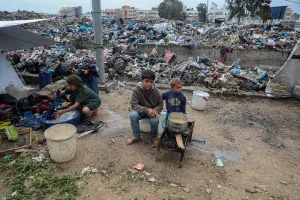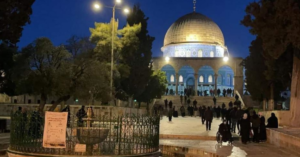By: Ali Farkhan Tsani, Senior Editor of MINA News
According to history, the initial name for the month of Ramadan was determined based on the seasonal conditions that occurred in that month, namely the very hot season or ramdhaa’ (رمضاء).
Imam An-Nawawi in the Book Tahdzib al-Asma wa al-Lughat, mentions several opinions of linguists, regarding the origin of the name Ramadhan, besides having the meaning of very hot, it is also taken from the word ar-ramidh (الرميض), which means clouds or rain that down at the end of summer, into autumn.
Rain is also called ar-ramidh because it reduces the influence of the heat of the sun. So this month is called Ramadan, because it cleanses the body of various sins.
Also Read: Fryday Sermon: Hijrah in the Struggle for the Liberation of Al-Aqsa and Palestine
Another opinion states that the name Ramadhan is taken from the Arab statement ramdhan an-nashl (رمضت النصل) which means sharpening a spear with two stones so that it becomes sharp. This is because Arab people in the past sharpened their weapons in this month, in preparation for war in the month of Shawwal, before the entry of the haram month.
Meanwhile, Imam Al-Qurthubi explained that it is called the month of Ramadan because in that month you can expunge (burn) your sins with good deeds.
That’s how it is called Ramadan because the throats of people who fast feel dry due to the hot weather of that month.
The heat is also due to the fact that the stomachs of fasting people burn during that month due to holding back food and drink all day.
Also Read: Sadaqah, A Simple Act with Extraordinary Virtues: Dr. Wahyudi KS
Burning heat can also be meaningful because the month of Ramadan provides energy to burn away the sins committed by humans.
In the book “Essentials of Ramadan, The Fasting Month” by Tajuddin Shuaib, it is stated that after Muslims developed a lunar-based calendar (Qamariyah), on average it was 11 days shorter than the solar-based calendar (Christian calendar). The month of Ramadan no longer always coincides with summer.
So, people better understand the heat of Ramadan metaphorically (figuratively). Because on the days of Ramadan people fast, their throats feel hot due to thirst. This also means that with worship in the holy month of Ramadan, previous sins are burned and after Ramadan they are forgiven.
Therefore, in the month of Ramadan, Muslims reorganize and renew their physical, spiritual and moral strength, as heat represents something that can melt matter. (Source: Khazanah Ramadhan, Pakuan University, 2022).
Also Read: The Dynamics of Living in a Muslim Community in the Modern Era
Therefore, in this glorious month of Ramadan, the souls of Muslims are burned, tempered and trained with various Ramadan practices, so that their desires are subdued and the stains of their sins are completely eroded. Until after Ramadhan, the level of piety towards Allah is achieved. Until we obtain Allah’s forgiveness, as the Apostle promised:
وَمَنْ صَامَ رَمَضَانَ إِيمَانًا وَاحْتِسَابًا غُفِرَ لَهُ مَا تَ قَدَّمَ مِنْ ذَنْبِهِ
Meaning: “Whoever fasts because of his faith (in Allah) and only hopes (for His pleasure), his past sins will certainly be forgiven.” (HR Bukhari from Abu Hurairah Radhiyallahu ‘Anhu).
In another hadith it is stated:
Also Read: The Meaning of “Minal Aidin wal Faizin”
مَنْ صَامَ رَمَضَانَ وَعَرَفَ حُدُوْدَهُ وَتَحَفَّظَ مِمَّا كَانَ يَنْبَغِيْ اَنْ يُتَحَفَّظَ مِنْهُ غُفِرَ لَهُ مَا تَقَدَّمَ مِنْ ذَنْبِهِ
Meaning: “Whoever fasts during Ramadan and observes all its limits, and protects himself from everything that is good for himself, his fasting will surely cover his past sins.” (HR Ahmad and Al-Baihaqi from Abu Sa’id Radhiyallahu ‘Anhu).
Hopefully, by fasting this Ramadan, we can burn and erase our sins throughout the past year. Amen. (AT/RE/P2)
Mi’raj News Agency (MINA)



































 Mina Indonesia
Mina Indonesia Mina Arabic
Mina Arabic